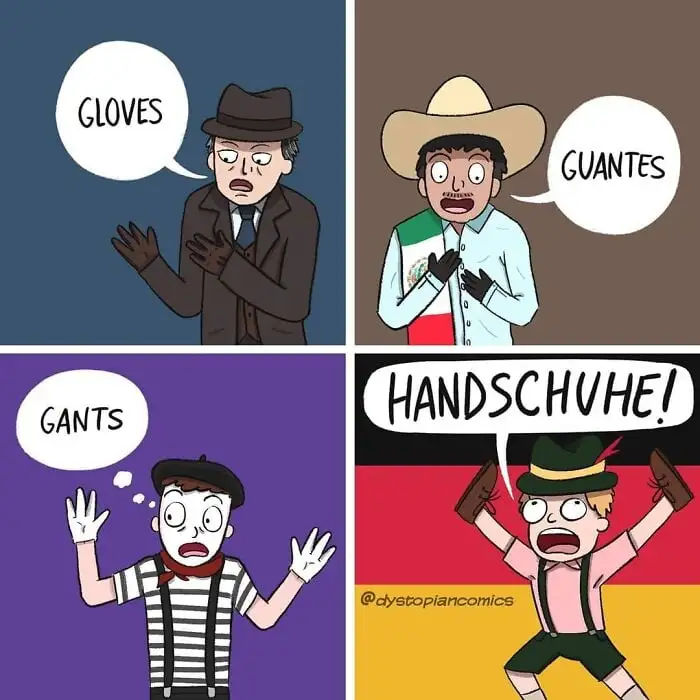Japanese: 手袋 = Tebukuro = Hand bag/sack
9 0 ReplyIf it weren't for all that Latin and French influence, we'd still be calling them handshoes, too.
28 0 ReplyEskularruak.
I prefer to call my gloves handfurs thankyouverymuch
13 0 ReplyHandskar, I stand with the Germans on this one
51 0 ReplyI know it's not likely, but I REALLY like the idea of "handcar"
12 0 ReplyIt's not exactly handcar, but "vehicle" in german is "drivething" (Fahrzeug).
19 0 Reply
Har undrat vad "skar" betyder i ordet. Hand är ju självklart men inte hittat något om vad skar menar eller brukade mena.
3 0 Reply"av ord motsvarande HAND och SKO"
6 0 Reply
Me when languages from different groups have different words for an object
63 2 ReplyHandshoes
35 0 Replybless you
26 0 Reply
Actually, English is a Germanic language. However, you are right that this specific word in English is not Germanic.
12 0 ReplyEnglish is a chimera that ate the faces of 3 other languages and wears their skins
6 0 ReplyMost words in English aren't.
23 0 Reply
Once you can wrap your head around Handshuhe, Fingerhut becomes obvious. "Ah, so this is how this is going to go."
22 0 ReplyGlove: From Middle English glove, glofe, from Old English glōf, *glōfe, *glōfa, ("glove"; weak forms attested only in plural form glōfan (“gloves”)), from Proto-Germanic *galōfô (“glove”), from Proto-Germanic *ga- (“collective and associative prefix”) + Proto-Germanic *lōfô (“flat of the hand, palm”)
Enjoy your palmsies
4 0 ReplyI also learned today that a German word for accordion is Handharmonika, and I love it so much.
5 0 ReplyIt seems to be Ziehharmonika, acc to Google Translate.
3 0 ReplyPull harmonica
2 0 ReplyI think there are multiple words (like Akkordion), but it may be a brand name?

2 0 Reply
It's almost like they have different root languages
7 1 ReplyIn Japanese, gloves is "tebukuro", 手袋, where 手 ("te") means hand, and 袋 ("fukuro") means sack.
5 0 Reply4 Germans downvoted with their handtoes
6 0 ReplyHandschuhe literally translates into "hand shoes" so it’s the only one that makes any sense.
6 0 ReplyWell, in English, “glove” is made up of two parts: g + love. The G is for your homies, and the love part is holding hands with your homies, and that’s what wearing a glove feels like.
Don’t fact-check me. >.>
2 0 ReplyWhat not being conquered by the Romans does to a language.
Welsh is another good example
5 0 ReplyThen a wild перчатки (perchatki) appeared.
1 0 ReplyCan appreciate the french mime not speaking it.
1 0 Reply


